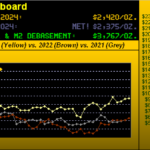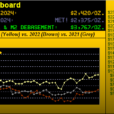
Last week, commercial mortgage REIT Blackstone Mortgage Trust (BXMT) reported first-quarter earnings, and the loan charge-offs are starting to pile up. Pixabay The BXMT results give us a snapshot of the commercial mortgage market, specifically office mortgages.We can also examine the prospects for this finance REIT and its competitors.
Pixabay The BXMT results give us a snapshot of the commercial mortgage market, specifically office mortgages.We can also examine the prospects for this finance REIT and its competitors.  BXMT has a $21.1 billion portfolio of 171 senior loans on commercial properties. The property types are 36% office, 27% multi-family, 18% hospitality, and the remaining 19% spread over five types of properties.For the first quarter, the portfolio was 92% performing. It’s not good to have 8% of a loan portfolio that is not current. For the first quarter, the company increased its CECL (current expected credit losses) reserves to $766 million, up from $592 million at the end of 2023. Fifty-six percent of the loss reserves are on U.S. office assets.During the quarter, Blackstone Mortgage Trust resolved five loans, which resulted in a 50% decrease in distributable earnings per share. Prior to the charge-offs, the distributable EPS would have been $0.65. Post-charge-offs, the number was $0.33 per share.The company declared and paid a $0.62 per share in April.The charge-offs were not as drastic to cash flow as they seem. The CECL rules would have already included the losses in prior loss reserves.Blackstone Mortgage Trust faces continued challenges as commercial real estate values remain low. However, there are some positives.The company had $1.05 billion in loan repayments in the first quarter. Of the repayment amount, 56% was on office building loans.The percentage of the portfolio covering office buildings is down dramatically from a few years ago. In 2019, 58% of the portfolio was loans on office buildings.Blackstone Mortgage Trust has historically maintained a conservative loan portfolio. The weighted average loan-to-origination value is 63%, and the debt to equity is 3.2 times.I suspect Blackstone Mortgage Trust will survive the current commercial property value crisis. The conservative management of the portfolio should allow it to continue to pay the current dividend (13.6%) yield.Other commercial REITs with less conservative portfolios could suffer more significant losses and be forced to cut dividends.I prefer and recommend one commercial finance REIT: Starwood Property Trust Inc. (STWD). I would stay clear of the commercial real estate sector outside of STWD.More By This Author:REITs Are Undervalued – Here’s ProofThe High-Yield Stock For Energy InvestingThe High-Yield Way To Play Spiking Oil Prices
BXMT has a $21.1 billion portfolio of 171 senior loans on commercial properties. The property types are 36% office, 27% multi-family, 18% hospitality, and the remaining 19% spread over five types of properties.For the first quarter, the portfolio was 92% performing. It’s not good to have 8% of a loan portfolio that is not current. For the first quarter, the company increased its CECL (current expected credit losses) reserves to $766 million, up from $592 million at the end of 2023. Fifty-six percent of the loss reserves are on U.S. office assets.During the quarter, Blackstone Mortgage Trust resolved five loans, which resulted in a 50% decrease in distributable earnings per share. Prior to the charge-offs, the distributable EPS would have been $0.65. Post-charge-offs, the number was $0.33 per share.The company declared and paid a $0.62 per share in April.The charge-offs were not as drastic to cash flow as they seem. The CECL rules would have already included the losses in prior loss reserves.Blackstone Mortgage Trust faces continued challenges as commercial real estate values remain low. However, there are some positives.The company had $1.05 billion in loan repayments in the first quarter. Of the repayment amount, 56% was on office building loans.The percentage of the portfolio covering office buildings is down dramatically from a few years ago. In 2019, 58% of the portfolio was loans on office buildings.Blackstone Mortgage Trust has historically maintained a conservative loan portfolio. The weighted average loan-to-origination value is 63%, and the debt to equity is 3.2 times.I suspect Blackstone Mortgage Trust will survive the current commercial property value crisis. The conservative management of the portfolio should allow it to continue to pay the current dividend (13.6%) yield.Other commercial REITs with less conservative portfolios could suffer more significant losses and be forced to cut dividends.I prefer and recommend one commercial finance REIT: Starwood Property Trust Inc. (STWD). I would stay clear of the commercial real estate sector outside of STWD.More By This Author:REITs Are Undervalued – Here’s ProofThe High-Yield Stock For Energy InvestingThe High-Yield Way To Play Spiking Oil Prices















